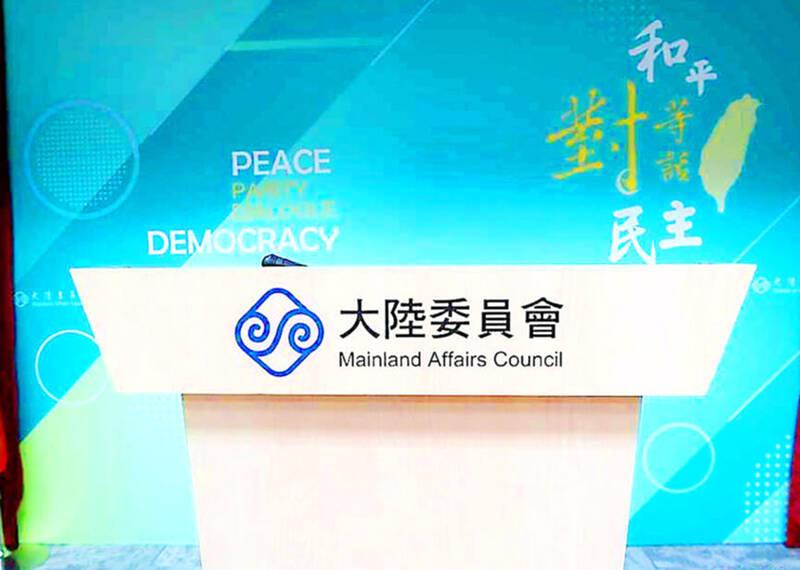Taipei has raised the alarm about the growing risks Taiwanese people could face when visiting China, pointing to an expanded state secrets law that will take effect on Wednesday.
Chinese lawmakers passed the revised Law on Guarding State Secrets in February, according to state news agency Xinhua, expanding the definition of such sensitive information to include a new category known as “work secrets”.

Photo: Chung Li-hua, Taipei Times
For people from democratic Taiwan -- which Beijing claims as part of its territory -- the expanded law means the risk of visiting China is likely to “increase significantly”, Taipei’s Mainland Affairs Council (MAC) said in a statement Tuesday.
Under the updated law, the “work secrets” category is defined as information that is “not state secrets but will cause certain adverse effects if leaked”, according to the MAC, which handles cross-strait affairs.
It added that the expanded legislation was “highly vague and may cause people to break the law at any time”.
At the time of the law’s passage, Xinhua said it stressed “the importance of upholding the CCP’s (Chinese Communist Party’s) leadership over work to guard state secrets”.
The MAC criticised Beijing for “continuously using legislations” to strictly monitor overseas visitors to China, saying cases of “fabricated crimes” being levelled against Taiwanese and foreigners “are not uncommon”.
“We would like to once again remind the public to refrain from going to China for the time being unless necessary,” it said on Tuesday.
Among the most high-profile Taiwanese arrested in China was democracy activist Lee Ming-che in 2017.
He was jailed for five years on a national security conviction and released in 2022.
Last year a Taiwanese man who is vice chair of a minor political party that advocates for the island’s independence was arrested in China and charged with “secession”.
MAC’s announcement on Tuesday comes less than a month out from the inauguration of president-elect Lai Ching-te, whom China considers a “dangerous separatist” who will lead Taiwan down a path of “war and decline”.
He, like President Tsai Ing-wen, rejects Beijing’s claim on the island.

The manufacture of the remaining 28 M1A2T Abrams tanks Taiwan purchased from the US has recently been completed, and they are expected to be delivered within the next one to two months, a source said yesterday. The Ministry of National Defense is arranging cargo ships to transport the tanks to Taiwan as soon as possible, said the source, who is familiar with the matter. The estimated arrival time ranges from late this month to early next month, the source said. The 28 Abrams tanks make up the third and final batch of a total of 108 tanks, valued at about NT$40.5 billion

Two Taiwanese prosecutors were questioned by Chinese security personnel at their hotel during a trip to China’s Henan Province this month, the Mainland Affairs Council (MAC) said yesterday. The officers had personal information on the prosecutors, including “when they were assigned to their posts, their work locations and job titles,” MAC Deputy Minister and spokesman Liang Wen-chieh (梁文傑) said. On top of asking about their agencies and positions, the officers also questioned the prosecutors about the Cross-Strait Joint Crime-Fighting and Judicial Mutual Assistance Agreement, a pact that serves as the framework for Taiwan-China cooperation on combating crime and providing judicial assistance, Liang

A group from the Taiwanese Designers in Australia association yesterday represented Taiwan at the Midsumma Pride March in Melbourne. The march, held in the St. Kilda suburb, is the city’s largest LGBTQIA+ parade and the flagship event of the annual Midsumma Festival. It attracted more than 45,000 spectators who supported the 400 groups and 10,000 marchers that participated this year, the association said. Taiwanese Designers said they organized a team to march for Taiwan this year, joining politicians, government agencies, professionals and community organizations in showing support for LGBTQIA+ people and diverse communities. As the first country in Asia to legalize same-sex

MOTIVES QUESTIONED The PLA considers Xi’s policies toward Taiwan to be driven by personal considerations rather than military assessment, the Epoch Times reports Chinese President Xi Jinping’s (習近平) latest purge of the Chinese People’s Liberation Army (PLA) leadership might have been prompted by the military’s opposition to plans of invading Taiwan, the Epoch Times said. The Chinese military opposes waging war against Taiwan by a large consensus, putting it at odds with Xi’s vision, the Falun Gong-affiliated daily said in a report on Thursday, citing anonymous sources with insight into the PLA’s inner workings. The opposition is not the opinion of a few generals, but a widely shared view among the PLA cadre, the Epoch Times cited them as saying. “Chinese forces know full well that